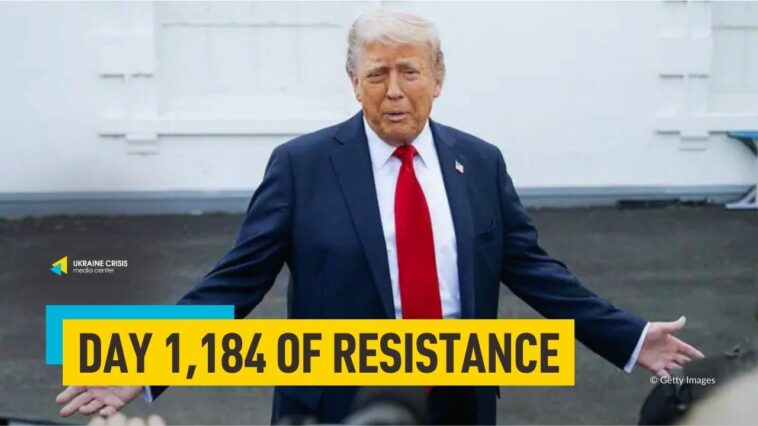Trump tells European leaders Putin isn’t ready to end Russia’s war on Ukraine because he thinks he’s winning, the WSJ says. Russia conducts a malicious cyber campaign against NATO logistics, technology companies. Russia reports a major drone attack.
Trump tells European leaders Putin not ready to end war on Ukraine because he thinks he’s winning, WSJ says
On a call Monday, President Trump told European leaders that Russian President Vladimir Putin isn’t ready to end the war in Ukraine because he thinks he is winning, the Wall Street Journal reports, citing four senior European officials familiar with the conversation. The paragraphs below are quoted from the article.
The acknowledgment was what European leaders had long believed about Putin—but it was the first time they were hearing it from Trump. It also ran counter to what Trump has often said publicly, that he believes Putin genuinely wants peace.
Although Trump appears to have come around to the idea that Putin isn’t ready for peace, that hasn’t led him to do what the Europeans and Ukrainian President Volodymyr Zelensky have been arguing he should do: double down on the fight against Russia.
Trump had held an earlier call with European leaders on Sunday—a day before his two-hour conversation with Putin. He had indicated then that he could impose sanctions if Putin refused a cease-fire, according to people familiar with the conversation.
By Monday, he had shifted again. He wasn’t ready to do that.
While the effort ultimately didn’t succeed in getting Trump to do that through additional sanctions, Europeans saw some upside to the outcome. The process had helped clarify for everyone, including Trump, where Putin stood: He is unwilling to halt the war at this stage. And for the Europeans, it helped underscore that it was now largely up to them to support Ukraine. Europeans don’t believe the Trump administration will stop U.S. weapons exports as long as Europe or Ukraine pays for them, the people said.
“This isn’t my war,” Trump told reporters on Monday after his Putin call. “We got ourselves entangled in something we shouldn’t have been involved in.”
Trump had indicated in a call with European leaders Sunday—which included Macron, Merz, Meloni and U.K. Prime Minister Keir Starmer—that he would dispatch Secretary of State Marco Rubio and special envoy Keith Kellogg to talks that are now expected to take place at the Vatican. On Monday, Trump appeared to be noncommittal about a U.S. role, according to one of the people briefed on the call.
Some of the Europeans on the call Monday insisted that the outcome of any talks at the Vatican must be an unconditional cease-fire. But Trump again demurred, saying he didn’t like the term “unconditional.” He said he had never used that term, although he used it when calling for a 30-day cease-fire in a post on his Truth Social platform on May 8. The Europeans eventually agreed to drop their insistence on the adjective.
Russia conducts malicious cyber campaign against NATO logistics, technology companies
Since 2022, Russia’s military intelligence service (GRU) has conducted a malicious cyber campaign against Western logistics entities and technology companies involved in the coordination, transport, and delivery of foreign assistance to Ukraine, NATO allies said in a joint cybersecurity advisory on Wednesday.
At least 11 allies, Moldova and Ukraine were targeted.
“For over two years, the Russian GRU 85th GTsSS, military unit 26165—commonly known in the cybersecurity community as APT28, Fancy Bear, Forest Blizzard, BlueDelta, and a variety of other identifiers—has conducted this campaign using a mix of known tactics,” the report reads.
The Russian state-sponsored campaign targeted organizations involved in the “coordination, transport, and delivery of foreign assistance to Ukraine.”
“These actors have targeted entities associated with the following verticals within NATO member states, Ukraine, and at international organizations: defense industry, transportation and transportation hubs (ports, airports, etc.), maritime, air traffic management and IT services,” according to the text.
“The actors also conducted reconnaissance on at least one entity involved in the production of industrial control system (ICS) components for railway management, though a successful compromise was not confirmed,” it said.
After gaining initial access to the network, the actors pursued further access to accounts with access to sensitive information on shipments, such as train schedules and shipping manifests. These accounts contained information on aid shipments to Ukraine, including train, plane or ship numbers, and container registration numbers.
The Russian GRU targeted servers hosting IP cameras primarily located at border crossings and railway hubs to follow aid delivery in real time.
The countries with targeted entities include Bulgaria, the Czech Republic, France, Germany, Greece, Italy, Moldova, the Netherlands, Poland, Romania, Slovakia, Ukraine and the U.S., according to Wednesday’s statement.
Russia reports major drone attack
Ukrainian drones attacked several Russian regions overnight and throughout the day on Wednesday.
The Russian defense ministry said it had shot down 150 drones overnight, adding a 100 more to the count later in the day.
The Oryol region accounts for the highest number of drones shot down. The region’s semiconductor plant caught fire as a result of the attack.
Russia said it had intercepted 27 drones in the Moscow region. In the capital, airports suspended operations several times. In the Lipetsk region, mobile internet was temporarily shut down. Customers in the regions of Moscow, Voronezh and Tula also experienced internet outages.
Between January and May 2025, drone attacks forced Russian airports to temporarily shut down at least 217 times.

